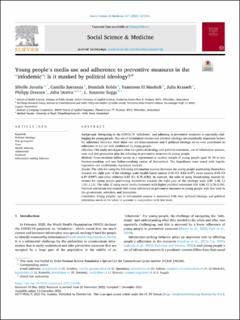Please use this identifier to cite or link to this item:
https://doi.org/10.21256/zhaw-26487| Publication type: | Article in scientific journal |
| Type of review: | Peer review (publication) |
| Title: | Young people's media use and adherence to preventive measures in the “infodemic” : is it masked by political ideology? |
| Authors: | Juvalta, Sibylle Speranza, Camilla Robin, Dominik El Maohub, Yassmeen Krasselt, Julia Dreesen, Philipp Dratva, Julia Suggs, L. Suzanne |
| et. al: | No |
| DOI: | 10.1016/j.socscimed.2022.115596 10.21256/zhaw-26487 |
| Published in: | Social Science & Medicine |
| Volume(Issue): | 317 |
| Issue: | 115596 |
| Issue Date: | 13-Dec-2022 |
| Publisher / Ed. Institution: | Elsevier |
| ISSN: | 0277-9536 1873-5347 |
| Language: | English |
| Subjects: | Political ideology; Risk perception; Trust; Health behavior; Adolescent; Pandemic; Information seeking behavior |
| Subject (DDC): | 302.23: Media 614: Public health and prevention of disease |
| Abstract: | Background: Navigating in the COVID-19 “infodemic” and adhering to preventive measures is especially challenging for young people. The use of information sources and political ideology are empirically important factors for adherence behavior. How these two are interconnected and if political ideology on its own contributes to adherence is not yet well established in young people. Objective: This study investigates what role political ideology and political extremism, use of information sources, trust and risk perception play for adhering to preventive measures in young people. Methods: Cross-sectional online survey in a representative random sample of young people aged 15–34 in two German-speaking and one Italian-speaking canton of Switzerland. The hypotheses were tested with logistic regression and multivariate regression analysis. Results: The odds for using the following information sources decreases for young people positioning themselves towards the right pole of the ideology scale: health-based sources 0.90 (CI: 0.84–0.97), news sources 0.93 (CI 0.87–0.997) and other websites 0.83 (CI: 0.75–0.92). In contrast, the odds of using broadcasting sources increases for young people positioning themselves towards the right pole of the ideology scale (OR: 1.08, CI 1.01–1.15). The odds of using social media decreases with higher political extremism (OR 0.88, CI 0.78–0.99). Political extremism was related with lower adherence to preventive measures in young people with low trust in the government, scientists, and journalists. Conclusion: Young peoples' use of information sources is associated with their political ideology and political extremism needs to be taken in account in conjunction with low trust. |
| URI: | https://digitalcollection.zhaw.ch/handle/11475/26487 |
| Related research data: | https://doi.org/10.5281/zenodo.5801890 |
| Fulltext version: | Published version |
| License (according to publishing contract): | CC BY 4.0: Attribution 4.0 International |
| Departement: | Applied Linguistics School of Health Sciences |
| Organisational Unit: | Institute of Public Health (IPH) Institute of Language Competence (ILC) |
| Published as part of the ZHAW project: | Public COVID-19 pandemic discourses |
| Appears in collections: | Publikationen Gesundheit |
Files in This Item:
| File | Description | Size | Format | |
|---|---|---|---|---|
| 2022_Juvalta-etal_Young-people-media-use-preventive-measure-adherence.pdf | 955.03 kB | Adobe PDF |  View/Open |
Show full item record
Juvalta, S., Speranza, C., Robin, D., El Maohub, Y., Krasselt, J., Dreesen, P., Dratva, J., & Suggs, L. S. (2022). Young people’s media use and adherence to preventive measures in the “infodemic” : is it masked by political ideology? Social Science & Medicine, 317(115596). https://doi.org/10.1016/j.socscimed.2022.115596
Juvalta, S. et al. (2022) ‘Young people’s media use and adherence to preventive measures in the “infodemic” : is it masked by political ideology?’, Social Science & Medicine, 317(115596). Available at: https://doi.org/10.1016/j.socscimed.2022.115596.
S. Juvalta et al., “Young people’s media use and adherence to preventive measures in the “infodemic” : is it masked by political ideology?,” Social Science & Medicine, vol. 317, no. 115596, Dec. 2022, doi: 10.1016/j.socscimed.2022.115596.
JUVALTA, Sibylle, Camilla SPERANZA, Dominik ROBIN, Yassmeen EL MAOHUB, Julia KRASSELT, Philipp DREESEN, Julia DRATVA und L. Suzanne SUGGS, 2022. Young people’s media use and adherence to preventive measures in the “infodemic” : is it masked by political ideology? Social Science & Medicine. 13 Dezember 2022. Bd. 317, Nr. 115596. DOI 10.1016/j.socscimed.2022.115596
Juvalta, Sibylle, Camilla Speranza, Dominik Robin, Yassmeen El Maohub, Julia Krasselt, Philipp Dreesen, Julia Dratva, and L. Suzanne Suggs. 2022. “Young People’s Media Use and Adherence to Preventive Measures in the “Infodemic” : Is It Masked by Political Ideology?” Social Science & Medicine 317 (115596). https://doi.org/10.1016/j.socscimed.2022.115596.
Juvalta, Sibylle, et al. “Young People’s Media Use and Adherence to Preventive Measures in the “Infodemic” : Is It Masked by Political Ideology?” Social Science & Medicine, vol. 317, no. 115596, Dec. 2022, https://doi.org/10.1016/j.socscimed.2022.115596.
Items in DSpace are protected by copyright, with all rights reserved, unless otherwise indicated.